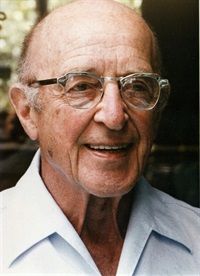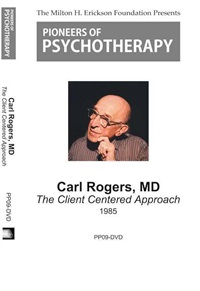Carl Rogers, MD - The Client-Centered Approach, 12/10/1985, Video Stream More info »
Carl Rogers, MD - The Client-Centered Approach
- Average Rating:
- Not yet rated
- Topic Areas:
- Clinical Demonstrations | Psychotherapy | Family Therapy
- Categories:
- Pioneers of Psychotherapy | Evolution of Psychotherapy | Evolution of Psychotherapy 1985
- Faculty:
- Carl Rogers, PhD
- Course Levels:
- Master Degree or Higher in Health-Related Field
- Duration:
- 00:59:00
- Copyright:
-
Dec 10, 1985
- Publisher:
- The Milton H. Erickson Foundation Press
- License:
- Never Expires.
Description
Description:
Carl Rogers (1985) demonstrates with Ann, who describes herself as suffering guilt and sadness after having put off becoming a mother to pursue her career. After deciding to have children, she miscarried twins and has since been unable to become pregnant. Rogers helps her access her own potential to experience herself more positively.
Educational Objectives:
- To know basic tenets of the client-centered approach.
- To give attendees an experience of the client-centered approach.
From conference EP85-WS05-DVD
*Sessions may be edited for content and to preserve confidentiality*
Credits
Faculty

Carl Rogers, PhD Related Seminars and Products
Carl Rogers, Ph.D, was an influential American psychologist and among the founders of the humanistic approach (or client-centered approach) to psychology. Rogers is widely considered to be one of the founding fathers of psychotherapy research and was honored for his pioneering research with the Award for Distinguished Scientific Contributions by the American Psychological Association (APA) in 1956. Carl received his Ph.D. in 1931 from Teachers College, Columbia University. Rogers has served as president of the American Psychological Association, the American Association for Applied Psychology, and the American Academy of Psychotherapists. He is the recepient of eight honorary doctorates and the Humanist of the Year Award from the American Humanist Association. The American Psychological Association offered him two awards: the Distinguished Scientific Contribution award for research in teh field of psychotherapy, and the first Distinguished Professional Contribution Award. Rogers also received the Award of Professional Achievements from the American Board of Professional Psychology. He is the author or co-author of 12 books and numerous articles in psychological, psychiatric, and educational journals dating from 1930.


